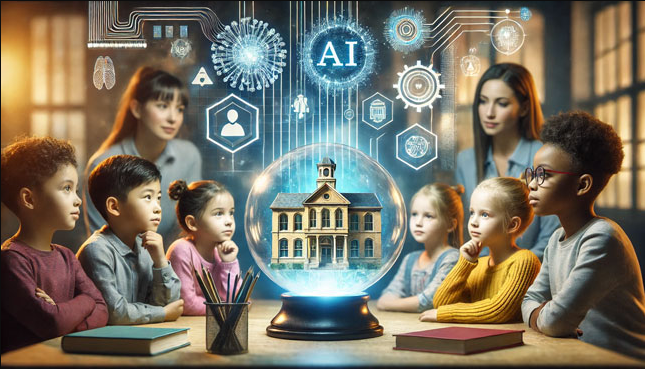
The Future of Learning: How AI Is Transforming Education in 2025
Artificial Intelligence (AI) has redefined countless industries, and education is no exception. As we navigate through 2025, AI has not only enhanced how students learn but also revolutionized how educators teach, administrators manage, and institutions innovate. From personalized learning experiences to virtual tutors, the integration of AI in education is reshaping the landscape in unprecedented ways. This article explores the major changes AI has brought to education, its benefits and challenges, and what the future may hold for students and teachers alike.
The Role of AI in Modern Education
AI in education refers to the use of machine learning, natural language processing, and intelligent data analytics to improve the learning process. In 2025, AI is no longer a futuristic concept; it is a foundational element of modern classrooms and online learning environments.
1. Personalized Learning at Scale
One of AI’s most impactful contributions is the ability to create customized learning experiences. AI systems analyze a student’s strengths, weaknesses, and learning pace to adapt content in real-time. Platforms like AI-powered learning management systems (LMS) recommend lessons, suggest revisions, and adjust difficulty levels to suit each learner.
For example, an eighth-grade student struggling with algebra may receive additional interactive exercises, while another excelling in the same subject could be offered more advanced topics. This tailored approach helps ensure no student is left behind.
2. Virtual Tutors and Assistants
AI-powered chatbots and virtual tutors provide round-the-clock academic support. These intelligent assistants answer questions, explain concepts, and guide students through complex material—functioning as an on-demand tutor. In higher education, these tools are used for everything from essay feedback to test preparation.
In 2025, students commonly rely on AI assistants not just for homework help, but also for time management and study planning, making education more accessible and efficient.
3. Automated Administrative Tasks
Teachers and school staff spend a significant portion of their time on non-teaching tasks like grading, scheduling, and attendance tracking. AI automates many of these processes, freeing educators to focus more on teaching and student interaction.
Grading software can evaluate multiple-choice tests and even written assignments with surprising accuracy. Meanwhile, intelligent scheduling systems optimize timetables based on student needs and teacher availability, enhancing school efficiency.
4. Intelligent Content Creation
AI tools assist educators in creating engaging, interactive, and dynamic content. From generating quizzes and flashcards to producing multimedia presentations and lesson plans, AI can significantly reduce the workload on teachers while enhancing the learning experience.
Some advanced systems even translate content into multiple languages or provide real-time subtitles, making lessons more inclusive for multilingual classrooms.
5. Predictive Analytics and Early Intervention
By analyzing attendance records, performance data, and behavioral patterns, AI can predict students who are at risk of falling behind or dropping out. Educators can then intervene with targeted support, such as tutoring or counseling, before the issues escalate.
This proactive approach helps in reducing dropout rates and improving overall academic outcomes.
Benefits of AI in Education
– Increased Accessibility
AI tools make education more inclusive for students with disabilities. Speech-to-text applications, text-to-speech readers, and intelligent note-takers assist students who face physical, auditory, or visual challenges.
– Enhanced Engagement
Gamification and adaptive learning systems maintain student interest by making lessons interactive and rewarding. AI tracks engagement levels and adjusts the pace or format accordingly.
– Global Learning Opportunities
With AI-driven platforms, students from rural or underserved communities can access quality education resources, bridging the digital divide and democratizing learning.
– Efficiency for Educators
By automating mundane tasks, AI enables teachers to dedicate more time to one-on-one student interaction, mentoring, and innovative teaching strategies.
Challenges and Concerns
While the benefits are clear, the widespread adoption of AI in education also presents challenges:
1. Data Privacy and Security
AI systems require access to vast amounts of personal and academic data. Protecting this data from breaches and ensuring ethical use is paramount.
2. Digital Divide
Not all students have equal access to technology or high-speed internet. Ensuring equitable access to AI-powered education is a continuing concern.
3. Teacher Training and Adaptation
Many educators are still adapting to the use of AI tools. Comprehensive training and ongoing support are necessary to ensure successful implementation.
4. Over-Reliance on Technology
There is a risk that students might rely too heavily on AI assistance, potentially undermining the development of critical thinking and problem-solving skills.
The Future Outlook
As AI technology evolves, its role in education will likely expand:
– Emotion AI and Sentiment Analysis
Future systems may detect student emotions via facial recognition or voice tone analysis, allowing educators to gauge mood and motivation, and adjust lessons accordingly.
– Fully Adaptive Learning Environments
Entire classrooms may become adaptive, changing lighting, ambient sound, and lesson formats based on students’ learning preferences and emotional states.
– Lifelong Learning and Microcredentials
AI will facilitate lifelong learning through personalized educational journeys and AI-curated microcredential programs, enabling adults to reskill and upskill efficiently.
– Global Collaboration
Language translation and real-time collaboration tools powered by AI will enable seamless learning across borders, fostering international educational communities.
Conclusion
In 2025, AI is not just supporting education—it is fundamentally transforming it. From personalized learning paths to intelligent administrative systems, AI is empowering educators and students alike. While challenges like data privacy and accessibility remain, the future of learning is bright, dynamic, and increasingly inclusive.
As we look ahead, embracing AI with ethical practices and thoughtful integration will be key to unlocking its full potential. The classroom of the future is already here—smart, responsive, and tailored to every learner’s unique journey.
